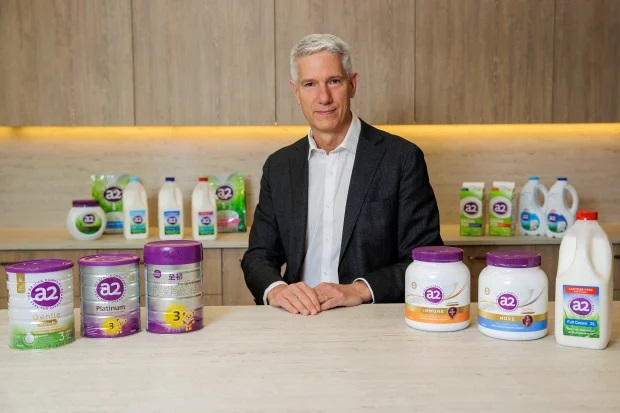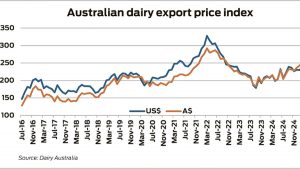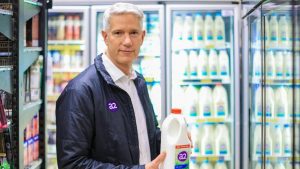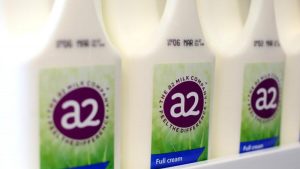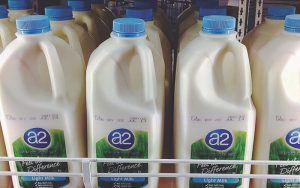
The a2 Milk Company has warned revenues will grow at just half the pace expected by investors over the next year, as the infant formula group struggles to ship products.
The ASX and New Zealand-listed group, which also supplies fresh milk and has been moving to manufacture its own goods rather than outsource production, also pushed out the timeline for revenues to reach $NZ2 billion ($1.8 billion) until 2027.
Investors dumped a2 Milk on that outlook, pushing shares some 17 per cent lower in one day. They were trading at $5.70 on Monday afternoon, their lowest level since April.
The poor outlook has overshadowed a good year for a2 Milk, which has grown its share of the lucrative infant formula market in China to 7.3 per cent. The company said infant formula sales grew 4.6 per cent over the 12 months to June 30, despite a population decline and lower childbirth rates in China over the past few years.
The company has also resolved a stoush with its partner, New Zealand’s Synlait Milk, which on Friday agreed to end its exclusive right to manufacture a2 Milk’s products. The company owns the intellectual property to milk without the A1 protein.
The company’s path to better margins and higher returns is in its strategy to manufacture some of its products itself, primarily at the Mataura Valley Milk facility in New Zealand that it acquired in 2021. But delays in striking a deal to end the exclusive rights deal with Synlait has pushed out profitability at Mataura until 2027.
That’s one reason that a2 Milk has moved its $NZ2 billion revenue target from 2026 to 2027. Exports to the United States are also taking longer to become profitable.
More immediately, a2 Milk chief executive David Bortolussi said the group faced higher freight costs to export into China after being caught short of available supply.
“The fourth quarter ended with less inventory than we would ideally like to have, and we’ve had some supply constraints from Synlait in July and August, which is being addressed now,” he said. “What has had a larger impact on us is the ability for Synlait to fulfil at the moment, which is impacting our stock availability, and will impact us for the next couple of months until we catch up our inventory levels in market.”
Mr Bortolussi said revenues this year would grow in the mid-single digits. This was lower than 9 per cent growth investors and brokers had been expecting.
Overall, a2 Milk revenue grew 5.2 per cent to $NZ1.68 billion in the year, meeting management guidance. The sale of fresh milk grew 4.8 per cent. Earnings rose 6.9 per cent to $NZ234.3 million, while after-tax profit rose 7.7 per cent to $NZ167.6 million.
The company said its Chinese label infant formula sales grew 9.5 per cent over the year. This was partially offset by a 14.6 per cent fall in Australia and New Zealand.
Mr Bortolussi said China remained a challenging market, with “downward pressure” on birthrates. “There’s still socio-demographic pressure on the number of newborns going forward, and this is a big issue for China as a country,” he said.
Wilson Asset Management portfolio manager Tobias Yao said a2 Milk’s results were strong despite the short-term issues. He believes the company is experiencing growing pains after resolving major structural issues over the past few years.
“The team in China is really delivering on winning share, and then also expanding into the lower-tier cities – that’s a positive,” he said. “The Synlait situation on Friday also provided more clarity. What’s disappointing is the temporary supply chain issues. That’s unfortunately hitting the top line as well as margins,” he said.
Mr Yao, who is an a2 Milk shareholder, said he was focused on the longer-term targets of $NZ2 billion in sales by 2027, and getting exports to the US to break even.
Citi’s Sam Teeger said the results released on Monday were strong and the supply chain issues are temporary. “Given the company’s history of underpromising and overdelivering, combined with an improving [Chinese] birth rate outlook, we are of the view that the company continues to track along nicely,” he said.
You can now read the most important #news on #eDairyNews #Whatsapp channels!!!
🇺🇸 eDairy News INGLÊS: https://whatsapp.com/channel/0029VaKsjzGDTkJyIN6hcP1K
